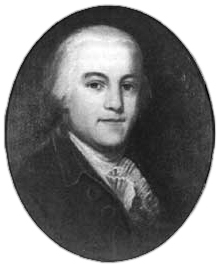Edward Rutledge
American politician, youngest signer of the Declaration of Independence (1749-1800)
Edward Rutledge (November 23, 1749 – January 23, 1800) was an American statesman, signer of the United States Declaration of Independence and governor of South Carolina.

| This article about a political figure is a stub. You can help out with Wikiquote by expanding it! |
Quotes
edit- I hope the Friends of Federal Government may be as successful in New York, as they have been in South Carolina. We had a tedious but trifling opposition to contend with. We had prejudices to contend with and sacrifices to make. Yet they were worth making for the good old cause. — People become more and more satisfied with the adoption, and if well administered, and administered with moderation they will cherish and bless those who have offered them a Constitution which will secure to them all the Advantages that flow from good government.
- Letter to John Jay (20 June 1788), published in The Correspondence and Public Papers of John Jay 1782-1793 (1793), p. 339
- I always considered an idle Life, as a real evil, but, a life of such hurry, such constant hurry, leaves us scarcely a moment for reflection or for the discharge of any other then the most immediate and pressing concerns.
- As quoted in John and Edward Rutledge of South Carolina (1997) by James Haw; ISBN 0-820-31859-0), p. 233
- Be mild and firm. Apply your best exertions to put us in a proper posture of defense.
- As quoted in John and Edward Rutledge of South Carolina (1997) by James Haw, p. 269
- Oh for a fleet that could look the proudest power in Europe in the face, on this our rightful Western Ocean! But alas, it must be left to posterity — at the age of 50 I can't expect to view it unless from above.
- As quoted in John and Edward Rutledge of South Carolina (1997) by James Haw, p. 272
Misattributed
edit- I find that I can agree fully with my good friend Patrick Henry when he said it cannot be emphasized too strongly or too often that this great nation was founded, not by religionists, but by Christians, not on religions, but on the Gospel of Jesus Christ.
- This is clearly spurious. The only published appearance of this attribution yet located is in Baking Recipes of Our Founding Fathers : Authentic Baking Recipes from the Wives and Mothers Of, & Trivia About, the Signers of the Declaration of Independence and Our Constitution (2004), by Robert W. Pelton, p. 213. As the "religionists" passage cited was not written until 1956, and was not misattributed to Henry until 1988, it is obvious that Rutledge (who died in 1800) can neither have said that he agreed with it nor attributed it to Henry.